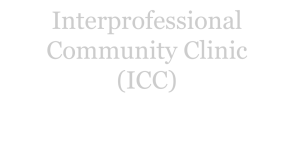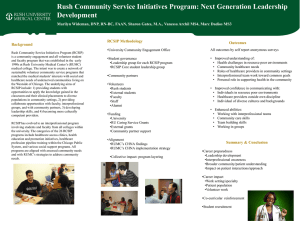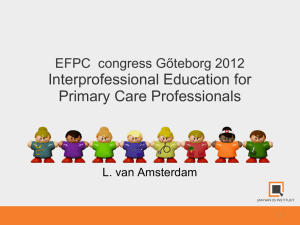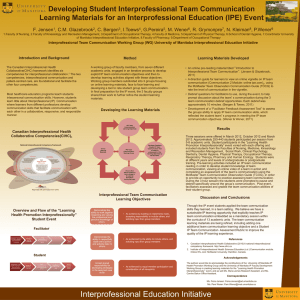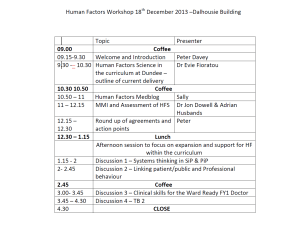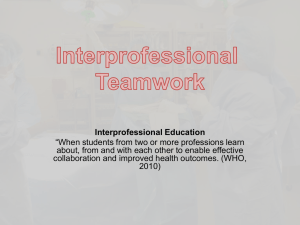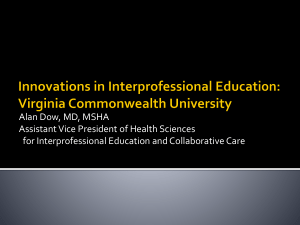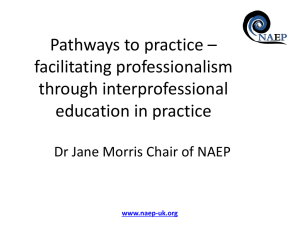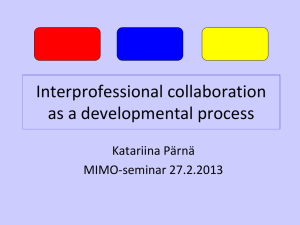Overview of programme and participants - Health Sciences
advertisement
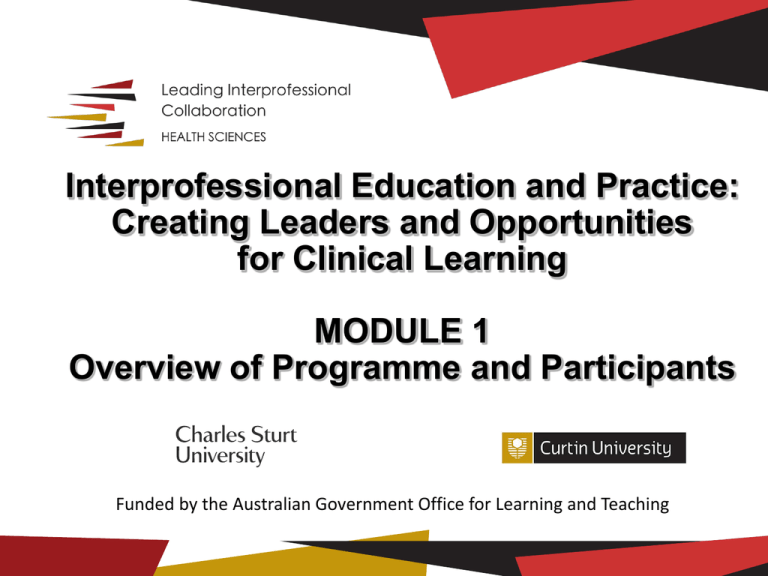
Interprofessional Education and Practice: Creating Leaders and Opportunities for Clinical Learning MODULE 1 Overview of Programme and Participants Funded by the Australian Government Office for Learning and Teaching Learning outcomes • Understand programme aims and structure • Understand the role of the participants and facilitator/s Course facilitators [INSERT NAME], [INSERT ROLE] [INSERT NAME], [INSERT ROLE] Centre for Aboriginal Studies (CAS) Mosaic. Joan Martin. Curtin University I acknowledge the Nyungar Wadjuk people as the traditional owners of country on which Curtin’s Bentley campus sits. I wish to acknowledge their continuing connection to land, sea and community and I pay my respects to them and their culture; and to elders, past present and future. Quote … “We welcome white brothers and sisters who are working together to improve the health of our people. We will go out with you - we will guide and support you - we will introduce you to the community. You will find that each of our communities shares a sense of humor - we hang on to it we are a resilient people and we welcome working together on this journey towards interprofessional collaboration.” Aboriginal Elder (World Health Organization, 2010) Our goal is to… Develop leaders in interprofessional education who have the knowledge, skills, attitudes and values to teach both learners and fellow colleagues the art and science of working collaboratively for better health care. Built on international best practice & developed in collaboration with the University of Toronto Funded by the Australian Government Office of Learning and Teaching Outcomes of the programme • Understand interprofessional education and interprofessional practice as well as the drivers for change • Understand approaches to interprofessional education that build on existing clinical learning opportunities • Apply change management strategies to embed interprofessional education in clinical settings • Develop an action learning plan to facilitate/support interprofessional education for students and colleagues in your setting Programme agenda • Introductions and background • Overview/theory and evidence of interprofessional practice and interprofessional education • Interprofessional practice capabilities: o client centered service o client safety & quality o collaborative practice communication role clarification team function conflict resolution reflection Programme agenda • Assessment and evaluation • Opportunities in your clinical settings • Interprofessional education facilitation • Collaborative change leadership • Readiness for interprofessional practice (IP - COMPASS tool) • Change leadership theories • Putting it all together • Sustainability and next steps The threads • Understand yourself as a professional • Understand yourself as an educator • Understand yourself as a leader • Understand yourself as a person Role of course facilitators • Create a safe learning environment • Share latest evidence in interprofessional education & interprofessional practice • Keep discussions focused • Ensure each person has an equal opportunity to share • Focus on process as well as task Participants Who is here? Participants ‘Getting to know you’ exercise • What are your hopes for participating in this 2 day course? • Establish one common hope you share across the table What did your needs assessment reveal? Background & context Principles; rationale; competencies; programme or curriculum design & implementation [INSERT OWN AGGREGATED RESULTS] Collaboration in practice Client centred & relational centred care; interprofessional processes & communication; group dynamics; conflict; reflection [INSERT OWN AGGREGATED RESULTS] Facilitation of interprofessional education Group development; managing small groups; giving & receiving feedback [INSERT OWN AGGREGATED RESULTS] Change leadership & evaluation Appreciative change leadership; [INSERT OWN evaluation methods; assessment AGGREGATED of interprofessional practice & RESULTS] interprofessional education Support for the production of this resource has been provided by the Australian Government Office for Learning and Teaching. The views expressed in this Power Point do not necessarily reflect the views of the Australian Government Office for Learning and Teaching. Unless otherwise noted, content on this site is licensed under the Creative Commons Attribution-ShareAlike 4.0 Unported License
